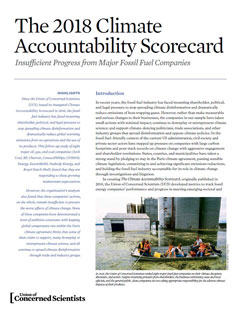Fossil fuel companies are facing increasing shareholder, legal and political pressure to stop spreading climate disinformation and to fix their business plans to achieve dramatic reductions in global warming emissions. While some companies are responding to this pressure, overall their efforts remain insufficient to prevent the worst impacts of climate change.
Company profiles and scorecard results
Results for ArchCoal and CONSOL Energy can be found in the report and appendices.
In 2016, when we first analyzed the actions of 8 major oil, gas, and coal companies, we found that none had made a clean break with disinformation on climate science and policy or planned adequately for a world free from carbon pollution.
In 2018, although some companies have publicly supported the Paris climate agreement to limit harmful warming, none of these companies has set company-wide emissions reduction targets consistent with this goal. Many continue to downplay or misrepresent climate science and the dangers of carbon emissions, and all continue to support trade groups that spread climate disinformation and work to stymie needed climate policies.
We evaluated eight companies on 28 metrics, organized in four broad areas:
- Disinformation: Have these companies stopped spreading disinformation about climate science and policies?
- Business Planning: Do these companies’ business plans align with a world free from carbon pollution?
- Policies: Do these companies support fair and effective climate policies?
- Disclosure: Are these companies fully disclosing the financial and physical risks of climate change to their business operations?
Findings
While every company improved its score on at least one metric and saw a score decline on one or more other metrics, there was no across-the-board improvement on any specific metric, and no single company improved in every area.
Explore each company’s score per metric in the table below. Colors indicate scores. Arrows indicate changes in each company’s performance compared to the 2016 Climate Accountability Scorecard.
Highlights
- Following engagement with Barnard College over its divestment evaluation and with UCS over our 2018 scorecard findings, BP removes from the company’s website a statement that misrepresented climate science and backslid from its 2016 position.
- Arch Coal, Chevron, ConocoPhillips and ExxonMobil include subtle “hedging” words on their websites and/or in SEC filings, falsely suggesting the (scientific) jury is still out on the connections between global warming gases and climate change and between the burning of fossil fuels and climate impacts such as sea level rise.
- Facing growing pressure from major shareholders, ExxonMobil and Chevron release climate risk disclosure reports. However, the reports lack commitments to reduce global warming emissions in line with the Paris climate agreement’s goal of keeping global temperature increase well below 2 degrees Celsius and striving to limit it to 1.5°C.
- BP, Chevron, and ExxonMobil fail to mention climate liability litigation explicitly in their financial filings. More than a dozen U.S. communities have filed lawsuits to hold these fossil fuel companies, and others, accountable for climate damages and preparedness. Company shareholders need to be informed about this risk to their investments.
- In July 2018, ExxonMobil becomes the latest oil and gas company to leave the corporate lobbying group American Legislative Exchange Council (ALEC) after successfully pressuring the group to drop a resolution against the U.S. Environmental Protection Agency’s 2009 finding that global warming gases are endangering the planet. ALEC has notoriously fought climate policies and drafted sample legislation that sought to hamper the development and use of low-carbon energy. Chevron and Peabody Energy maintain leadership positions in the group.
- Shareholder pressure leads ConocoPhillips in 2018 to expand its disclosures of lobbying and other public policy advocacy.
Recommendations
Major fossil fuel companies—including those studied in this 2018 scorecard—are substantial contributors to climate change, and therefore must take responsibility for their actions. Science now makes it possible to calculate that the eight companies in this study have contributed about 14 percent of global energy-related carbon dioxide and methane emissions driving disruptive climate change.
These eight leading fossil fuel companies have failed to fix their business models to reduce global warming emissions from their operations and the use of their products. At the same time, many of them have deliberately sowed public confusion about climate science and the dangers of climate change, while lobbying against needed climate policies that would help us transition to a low-carbon energy system.
These fossil fuel companies should:
- Renounce disinformation on climate science and policy
- Plan for a world free from carbon pollution, developing business models that are consistent with keeping global warming well below 2°C above pre-industrial levels, as agreed by world leaders
- Support sensible climate policies to reduce emissions of heat-trapping gases
- Fully disclose climate-related risks to their business
- Pay their fair share of the costs of climate-related damages and climate change adaptation
As a first step toward meeting emerging societal expectations, each company in this study should:
- If it is not yet doing so, consistently acknowledge the scientific evidence of human-caused climate change and affirm the consequent need for swift and deep reductions in emissions from the burning of fossil fuels
- Set company-wide, net-zero emissions targets consistent with the Paris climate agreement’s global temperature goal
- Disavow positions and actions taken by affiliated third parties—including trade associations and lobby groups—that are inconsistent with companies’ stated positions on climate science and policy
- Publicly and consistently advocate for specific policies and/or regulations to implement the Paris climate agreement
- Fully disclose climate-related risks they face and how they are managing them—including physical risks to their operations and financial risks related to climate liability lawsuits
UCS and our experts, partners, and supporters are watching. We will continue to keep a close eye on major fossil fuel companies to assess their actions and words, recognize progress where it occurs, and turn up the heat on companies lagging behind.




